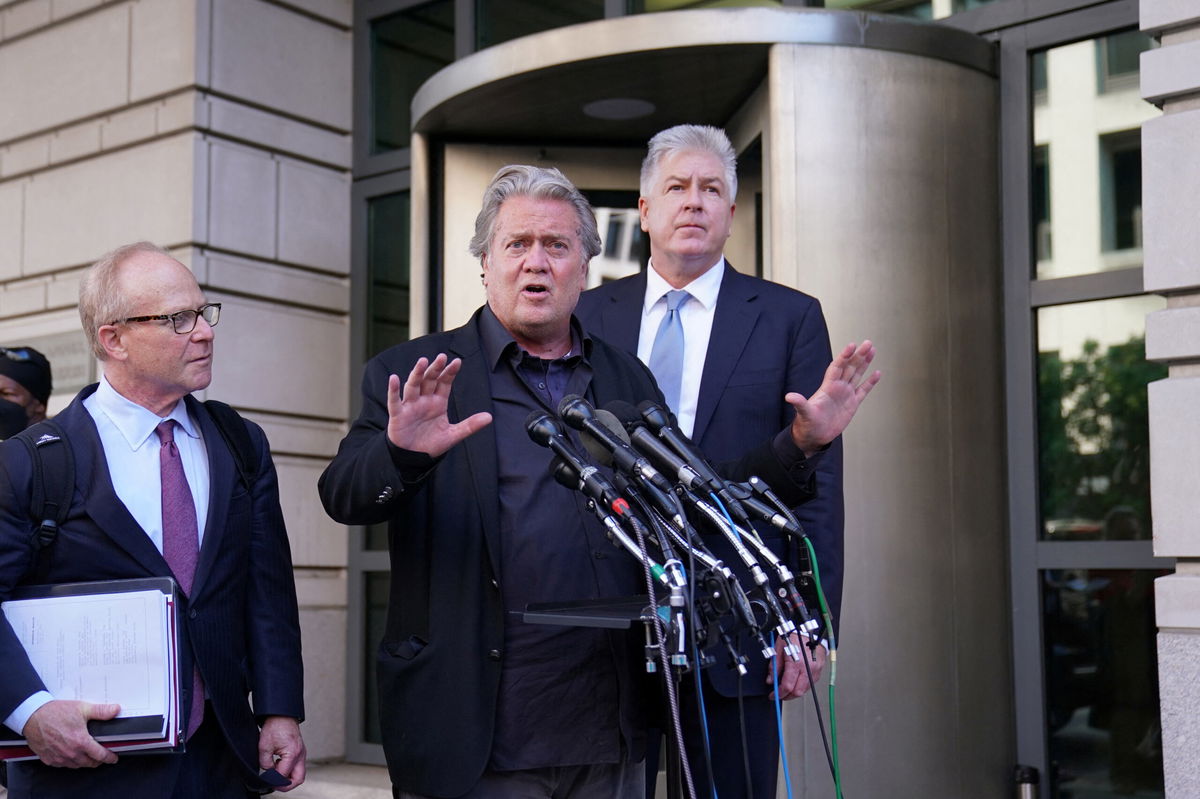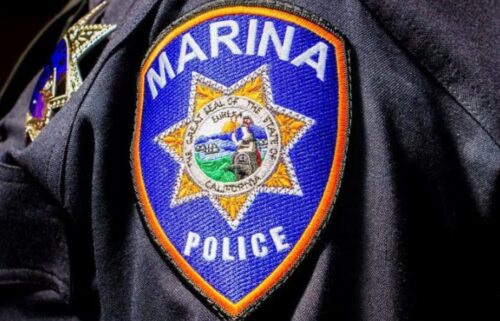Takeaways from Day 2 of the Steve Bannon contempt of Congress trial

Former Trump White House chief strategist Steve Bannon speaks to members of the press as he departs from the second day of the trial of the contempt of Congress charges stemming from his refusal to cooperate with the U.S. House Select Committee investigating the Jan. 6
By Tierney Sneed and Katelyn Polantz, CNN
The contempt of Congress trial against Steve Bannon got underway in earnest on Tuesday with opening statements and the first witness testimony after a failed last-minute effort from the Trump ally‘s team to delay the trial.
The simple case that prosecutors wish to put on was evident in an opening statement and in the questioning of their first witness, a House select committee staffer, who kept her testimony at a very basic level.
Bannon’s team tried to muddy those waters with insinuations of partisanship — both in an opening statement and in fiery remarks Bannon delivered outside the courtroom after the proceedings wrapped.
Here are the key takeaways from Tuesday:
Prosecutors keep it simple: ‘He just refused to follow the rules’
In her opening statement, prosecutor Amanda Vaughn said Bannon was defying a government order that citizens are obligated to follow, telling the jury it should find that “the defendant showed his contempt for the US Congress, US government, and that he’s guilty.” Bannon, by not complying with the subpoena, “prevented the government from getting the important information it needed from him.”
Speaking for about 20 minutes, Vaughn laid out why the committee investigating the January 6, 2021, insurrection was entitled to information from Bannon, going over how congressional committees do the research that shapes laws Congress enacts and why this committee was specifically interested in getting information from Bannon.
“Because it was a subpoena, Congress was entitled to the information it sought. It wasn’t optional. It wasn’t a request. It wasn’t an invitation. It was mandatory,” she said, as she stressed that the committee rejected the reasons Bannon put forward for not cooperating.
The case that prosecutors signaled they will put on is, in some ways, a product of several pre-trial rulings in their favor from US District Judge Carl Nichols. He has kept out of the trial much of the evidence Bannon sought to present — including most arguments about executive privilege. The Justice Department instead just has to prove that Bannon made a deliberate and intentional decision not to show up for the requested testimony or produce the demanded documents by set deadlines.
She framed the case as one “about the defendant thumbing his nose at the orderly process of our government.”
“This is not a case of a mistake,” she told the jury. “The defendant didn’t get the date wrong. He didn’t get confused on where to go. He didn’t get stuck on a broken-down metro car. He just refused to follow the rules.”
Bannon’s team plays politics
A long morning of bitter legal argument from Bannon’s team led to a relatively short, 15-minute opening statement from his defense attorney Evan Corcoran — and a long public diatribe from Bannon later.
Corcoran’s opening statement was the first time the public and the court heard Bannon’s team’s full framing of their defense, after days of their protests. He explained to jurors they would hear about some negotiating around Bannon’s subpoena, then hinted that partisanship was afoot when the House select committee subpoenaed his client.
“The evidence was crystal clear: No one, no one believed Steve Bannon was going to appear on October 14, 2021,” Corcoran argued.
He also asked the jury to wonder, as they see evidence such as Bannon’s subpoena and contempt referral, “Is this piece of evidence affected by politics?”
After the proceedings, Bannon’s tone was hostile as he spoke from the sidewalk outside the courthouse. He railed at House select committee Chairman Bennie Thompson, attacking the committee’s work and how prosecutors’ case was being presented.
“I challenge Bennie Thompson today to have the courage to come to this courthouse. If he’s gonna charge somebody with a crime, he’s got to be man enough to show up here,” Bannon said.
Bannon’s team previously tried to subpoena several House members to testify, but the judge wouldn’t allow it, removing one strategy his team had hoped to use. Still, there is a small possibility that the judge may revisit Bannon’s wish to call Thompson to testify, depending on how the staffer’s testimony and the rest of the prosecutors’ case goes.
Straightforward testimony from committee staffer
With the Justice Department’s first witness on the stand to close the afternoon, testimony so far has been as straightforward as prosecutors can make it.
Did Bannon produce records by his subpoena deadline of October 7?
“He did not,” Kristin Amerling, a deputy staff director on the committee, said.
Did Bannon appear for testimony as his subpoena required on October 14?
“He did not,” Amerling said, again, in the witness box.
The testimony highlighted how simple the Justice Department has sought to make the case for jurors — including by putting Congress’ work in the most basic terms.
Amerling also laid out the parameters of the House committee and how it functions. She spoke about its fact-finding work needing to be done with urgency, because “the threat to our democratic institutions continues.” And she described how the committee sought out Bannon because of his contacts with Trump and others in Trump’s circles, including at the Willard Hotel before the January 6 riot — all details included in the committee’s public letter to Bannon accompanying the subpoena.
Amerling returns for more testimony on Wednesday morning.
Verdict could come before Thursday’s prime-time hearing
Much of the drama of the Bannon trial has been about its timing.
Will this trial be short and straightforward (like prosecutors foresee) or long and more complicated (like Bannon hopes)? Would it be delayed for a month or longer, or could it even head to deliberations before the select committee prime-time hearing Thursday night?
Bannon has made several unsuccessful attempts to postpone this week’s trial, with his attorney on Tuesday morning seeking a month-long delay after a heated legal argument over what evidence can be presented in the case.
Nor did a Bannon team proposal to push the trial back just a few days get any real traction. At one point, Nichols suggested that they might need to wait until Wednesday to start the trial in earnest as the parties struggled to hash out a plan for dealing with certain evidence. But ultimately, that debate cost the proceedings only a few hours, and opening statements were able to kick off by mid-afternoon.
Only a handful of witnesses have been identified in both sides’ plans for the trial, meaning that the proceedings are still on track to take just a few days. The question now is whether Bannon’s charges will be deliberated by the jury before Thursday’s January 6 committee hearing.
The-CNN-Wire
™ & © 2022 Cable News Network, Inc., a WarnerMedia Company. All rights reserved.


